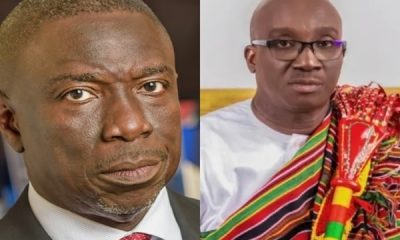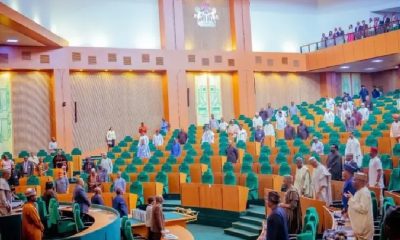News
Islamic Cleric Wants Death Penalty For Whoever Changes Religion

Dr. Ibrahim Jalingo, an Islamic scholar and the National Chairman of the Council of Ulama, has sparked intense public debate following a controversial statement supporting the death penalty for individuals who renounce Islam.
The cleric made his remarks in a post shared on Thursday via his official Facebook page, where he defended a Hadith that prescribes capital punishment for apostates.
Writing in the Hausa language, Jalingo offered a firm rebuttal to critics who challenge the authenticity of certain Hadiths, particularly one that states: “Whoever changes his religion, kill him.” He described such critics as victims of “compound ignorance” and accused them of intentionally misrepresenting Islamic teachings to create confusion among Muslims.
His response was directed at those questioning the consistency of the Hadith tradition with the Qur’an. One such critic, identified as Issiyaku Abdulkadir, had apparently presented a list of 100 Hadiths he claims contradict the Qur’an. Jalingo used this as an opportunity to launch a detailed theological counterargument.
“Today, I came across the first among what these fabricators call the ‘100 Hadiths that contradict the Qur’an.’ They claim believers in divine revelation cannot respond to these contradictions. The Hadith they referenced is: ‘Whoever changes his religion, kill him,’” Jalingo stated in his post.
He went on to issue a strong critique of his opponents, accusing them of misguiding the public. “Let it be known that Hadiths are not merely interpretative texts. They, like the Qur’an, are divinely inspired. The Prophet Muhammad (peace be upon him) said: ‘Indeed, I was given the Qur’an and something like it along with it.’ This affirms the divine origin of Hadith literature,” Jalingo argued.
To reinforce his position, the cleric cited several Qur’anic verses which, in his view, support the Hadith’s stance on apostasy. Among them was Surah At-Tawbah (9:5), which mentions combat against polytheists, and verses from Surah Al-Baqarah and Surah An-Nisa’ that refer to fighting non-believers in specific historical contexts.
He also addressed the popular Qur’anic verse “There is no compulsion in religion” (Surah Al-Baqarah 2:256), arguing that it has been abrogated by later revelations and should not be interpreted as a blanket guarantee of religious freedom. “Claims that this Hadith contradicts the Qur’an show a fundamental misunderstanding of Islamic jurisprudence and the concept of ‘naskh’ (abrogation), which is well-established in Islamic theology,” Jalingo said.
Jalingo’s tone grew increasingly combative as he criticized those spreading opposing views, using harsh language to discredit them. He likened their rhetoric to that of “prostitutes and effeminate men,” a choice of words that has drawn strong backlash online.
The cleric’s remarks have since gone viral, drawing a mix of reactions across social media. While some have applauded his defense of traditional Islamic scholarship, others have condemned his advocacy of capital punishment and his disparaging treatment of dissenting voices.
Broader Implications and Reactions
This incident has reignited ongoing debates within Muslim communities about the role of Hadith in modern jurisprudence, the limits of religious freedom, and the ethical boundaries of public discourse among religious leaders. While conservative scholars argue that Hadiths are essential to understanding and applying Islamic law, reformist voices stress the need for contextual interpretation, especially on sensitive issues like apostasy.
READ ALSO: No Approval For 3-storey Buildings Without Elevator – Abia Govt Warns Developers
Human rights advocates have also weighed in, warning that such endorsements of capital punishment for apostasy could fuel religious intolerance and justify violence under the guise of doctrinal purity.
The controversy underscores the tensions between traditional interpretations of Islamic law and contemporary human rights frameworks, a debate that continues to shape religious discourse across the Muslim world.
News
Again, suspected herders kill infant, six others in Benue attack

At least seven persons were reportedly killed by suspected armed herders on Thursday night in Agbo Vengav Udam community, Gwer West Local Government Area of Benue State.
The incident occurred just hours after gunmen, also believed to be armed herders, hijacked two commercial vehicles and abducted about 14 passengers near Naka, the headquarters of the local government area.
Sources told our correspondent that the attack took place around 7:00pm when the assailants stormed the community and opened fire indiscriminately on residents.
A local resident, who spoke on condition of anonymity, disclosed via telephone that the attackers accessed the village through a border community in Otukpo LGA.
“They came in through the Otukpo border village, entered Agbo, and began shooting sporadically. Seven people were killed instantly, and they abducted three others,” the source said.
It was gathered that among the victims was an infant, while the child’s mother was reportedly taken by the attackers.
Five of the deceased have been deposited in a morgue in Naka, while the families of the remaining two opted for immediate burial.
The incident has sparked fear among locals, many of whom have reportedly fled their homes to avoid further violence.
Confirming the attack, Chairman of Gwer West LGA, Mr Victor Ormin, said multiple people were killed in the assault.
“It is true that a number of people were killed in Vengav Udam village on Thursday night. Two others who sustained critical injuries are currently receiving treatment at Naka hospital,” Ormin stated.
He decried the rising wave of attacks in the area, saying: “This is becoming unbearable. The activities of these armed herders in the local government and the state at large are escalating.”
Efforts to reach the Benue State Police Command spokesperson, CSP Catherine Anene, were unsuccessful as calls to her mobile phone went unanswered.
News
Scandal! Osun monarch, pastor admit to COVID-19 fraud in US

The Apetu of Ipetumodu in Osun State, Oba Joseph Oloyede, and a Nigerian pastor, Edward Oluwasanmi, are facing possible prison sentences in the United States after pleading guilty to charges of COVID-19 relief fraud.
Oba Oloyede, a US-based accountant and information system expert, was appointed the new Apetu in July 2019.
The monarch and Oluwasanmi were arrested in early 2024 for their roles in a scheme to fraudulently obtain $4.2m in COVID-19 relief funds.
The two men were charged with 13 counts of conspiracy to commit wire fraud, wire fraud, conspiracy to defraud, money laundering, and engaging in monetary transactions in criminally derived property.
They were arraigned before Justice Christopher Boyko of the US District Court of Ohio.
Saturday PUNCH had exclusively reported the arraignment of Oloyede while residents of Ipetumodu were at a loss over his disappearance from the community after a trip abroad.
Our correspondent had reported that there was anxiety in the community after the 62-year-old was absent from several important festivals that required his presence.
After investigating, Saturday PUNCH confirmed that the monarch was being held by the US authorities.
According to court documents obtained by our correspondent, Oloyede and Oluwasanmi submitted falsified applications for Paycheck Protection Programme and Economic Injury Disaster Loans under the US Coronavirus Aid, Relief and Economic Security Act between April 2020 and February 2022, using fake tax and wage documents to secure funds meant to support struggling businesses during the pandemic.
The Act was designed to provide emergency financial assistance to Americans suffering the economic effects caused by the COVID-19 pandemic by issuing loans to small businesses and non-profit entities experiencing revenue loss due to the pandemic.
The Act also authorised the US Small Business Administration to issue advances or grants of up to $10,000 to small businesses.
Oba Oloyede, who was based in Medina, Ohio, before his enthronement, was accused of using some of his companies, including Available Tax Services Incorporated, Available Financial Corporation, and Available Transportation Company, to defraud the government through the COVID-19 relief fund.
Oluwasanmi was also accused of using his companies: Dayspring Transportation Limited, Dayspring Holding Incorporated, and Dayspring Property Incorporated to obtain millions of dollars, which he later diverted for his expenses, in breach of US federal laws.
According to court documents, Oba Oloyede and Oluwasanmi, among other things, fraudulently obtained the sum of $3.76m from the US Paycheck Protection Programme and Economic Injury Disaster Loans scheme.
After about one year in court, the duo pleaded guilty to some of the charges and might face some prison sentences.
On April 10, Oluwasanmi, through his counsel, Henry Hilow, pleaded guilty to counts one, 11, and 12 of the indictment.
In the said counts, Oluwasanmi was accused of using some of the proceeds of the fraud to purchase a commercial property on 422 South Green Road, South Euclid, Ohio, through wire transfer, and transferring money into Dayspring transportation brokerage account.
“Guilty plea entered to counts 1, 11 and 12 of the indictment. Plea agreement executed. Sentencing set for July 2, 2025, at 10am in Courtroom 9A. Defendant’s bond to continue with same conditions as previously ordered,” the document read.
On Monday, April 21, Oba Oloyede submitted his guilty plea before the court.
The court fixed Thursday, April 24, for the hearing of his pleas.
Oba Oloyede’s long absence from his community has been generating reactions from community leaders and chiefs, especially after he reportedly demolished the town’s palace with a promise to build a befitting one upon return from his trip before his arrest.
With the report of his trial in the US, some residents are demanding that the state government investigate the matter and intervene.
Credit: PUNCH
News
CBEX: EFCC declares four persons wanted over crypto fraud + photos

Four persons have been declared wanted by the Economic and Financial Crimes Commission (EFCC) for their alleged roles in a fraudulent scheme linked to the online trading platform, Crypto Bridge Exchange, better known as CBEX.
EFCC issued a public notice on Friday and named the individuals, Seyi Oloyede, Emmanuel Uko, Adefowora Oluwanisola, and Adefowora Abiodun Olaonipekun.

Signed by EFCC’s Head of Media & Publicity, Dele Oyewale, the notice restated its commitment to fighting financial crimes, particularly in the increasingly exploited crypto space.
The EFCC disclosed that while Oloyede and Uko were last traced to No. 166, Idimu Egbeda Road, Lagos State, Oluwanisola and Olaonipekun were last known to reside at 13, Jimoh Odutola, Ogungpa, Ibadan, Oyo State.
Members of the public with useful information on the whereabouts of the four persons were urged by the commission to reach out to the EFCC through its offices in Ibadan, Enugu, Kano, Lagos, Gombe, Port Harcourt, or Abuja.
-

 News17 hours ago
News17 hours ago2027: Pro-Fubara protesters want suspended Gov to run as Atiku’s VP(Video)
-

 News20 hours ago
News20 hours agoOborevwori /Okowa: PDP experiencing a rebirth and will soon bounce back-Saraki declares
-

 News18 hours ago
News18 hours agoEdo poll: How APC allegedly offered witnesses N30m bribe
-

 News18 hours ago
News18 hours agoFlights resume as NiMET unions suspend strike
-

 News11 hours ago
News11 hours agoRivers State is yet to fully stabilise– Ibas
-

 News14 hours ago
News14 hours agoOsun PDP Reps Dismiss Defection Claims, Pledge Support for Adeleke
-

 News18 hours ago
News18 hours agoOver 26,000 Lagos students failed 2024 WASSCE despite govt paying over N1.5bn WAEC fees
-

 News18 hours ago
News18 hours agoTeachers Strike: FCT minister, Wike summons Council Chairman





